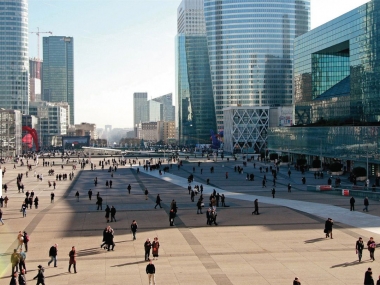6 Inspiring Presentations from RE-Block Mid-term Conference (28 March 2014)
Edited on
16 February 2015The Mid-term Conference (on 28th March 2014) saw 6 presentations related to the RE-Block partnership's work.
The event also aimed at supporting the Local Action Plan elaboration with some inspiring thoughts and to introduce some innovative solutions from Europe but outside the networking partnership. In accordance with the accentuated topics of the project the Conference focused on three specific fields which are also relevant to the project afterlife: governance, monitoring and financial schemes for urban regeneration.

Good Governance for urban regeneration – Piotr Lorens

If urban renewal is really a priority in a city, the municipality needs an organisational adjustment to enable the necessary integrated approach, and a strong support by local politicians. The taylor-made solution for Gelsenkirchen will differ in other cities, but must combine steering – coordination – local task force, in a practical way.
Monitoring urban regeneration projects and processes - Martin Dubbeling

The key issue addressed by the presentation was how to develop a knowledge based approach in regeneration which includes good - inclusive and effective – governance.
The overview of regeneration practices shows the evolution of approach in the past decades:
1985 – The first crisis of the large (Western) housing estates built in 1960s to 1970s implied deficiencies and market failure in West European countries. Response: technical upgrading.
1990 – Assessment of the challenges of the Eastern housing estates.
1995 – The practice in Central and East European countries was characterised by the assessment of risk, technical and environmental deficits, and the lack of management, legal and ownership provisions and relevant policies.
Post 1995 - In some Western countries – in limbo between demolition and rehabilitation.
Post 2000 – Large scale housing estates are a joint European issue. Many housing estates have acceptable quality, but some have become deeply problematic. Diversity of development was accepted. Therefore a turn from the strictly technical solutions to the more complex environmental (energy efficiency) and socio-economic considerations have been applied and political responsibility is required locally, nationally and on a European level.
Due to the complexity of the development issues, politicians have to be realistic and accept that certain elements of the development process are out of the range of the policy realm while others are in reach. To better understand the development processes and also the limits of development actions the culture of communication between the various actors needs to be clear and good governance, as well as knowledge management, has to be established and improved. A strategy of knowledge management identifies the ‘knowledge needs’ for actions and implies the various forms of knowledge (i.e. milieu-, institutional-, product-, expert-, leadership-, local) and reflexivity (cycles of learning and reacting to change). It needs formalized procedures for knowledge exchange from professional to story-telling. However reflexivity needs time – both are preconditions for knowledge based change.
What we expect from politicians and policy-making:
- understanding limits to actions
- allow all actors to experiment - on the basis of good inclusive knowledge
- risk sharing
- devolution of decisions to people – introducing self-organization in the fields of opportunities
- build new real partnerships
Outlook on future funding possibilities and spin-off projects - Hen Gerritse (Thematic Expert of RE-Block Project)

The European Parliament initiated a study to improve the understanding of how the European Regional Development Fund (ERDF) was used in housing projects in the 2007- 2013 funding period. This document also explores how ERDF has fostered integrated approaches which address simultaneously housing, energy and socio-economic needs of deprived communities.
In his presentation Mr. Tosics highlighted some case studies focusing on an overarching question: Are ERDF housing projects contributing to integrated sustainable regeneration in deprived areas?
The final result was that the ERDF housing intervention projects generally focused on physical improvement to housing (particularly around energy efficiency improvements and the use of renewable energy). There was less evidence of projects actively stimulating wider sustainable urban regeneration linked to social and economic issues. These projects tended to focus on improving individual blocks of flats or discrete areas of housing, rather than being part of a holistic integrated area-based development programme for entire neighbourhoods.
In the 2014-2020 programming period, integrated urban development is the key to achieve the EU2020 targets. To reach the set goals the available new tools are the Integrated Territorial Investment (ITI), the Community-Led Local Development (CLLD) and Horizon2020.
 Submitted by Simina Lazar on
Submitted by Simina Lazar on




